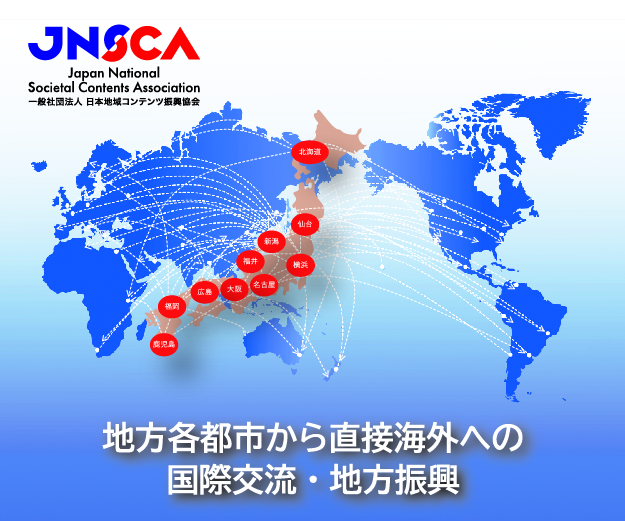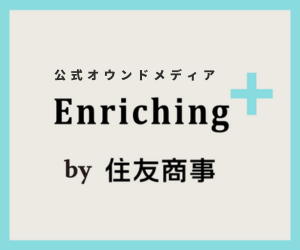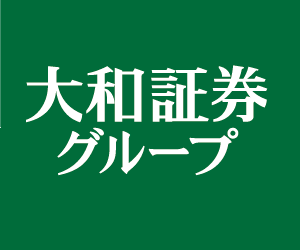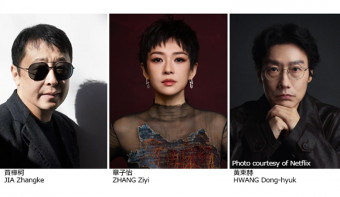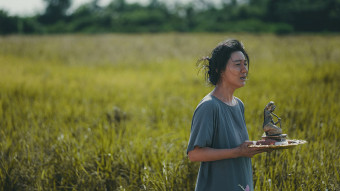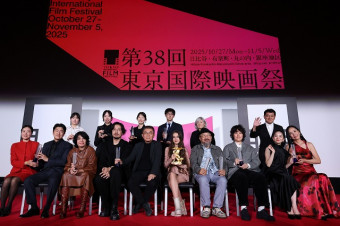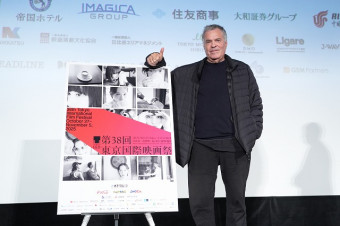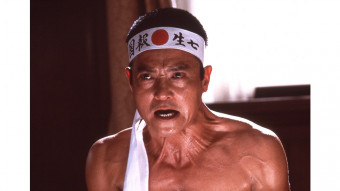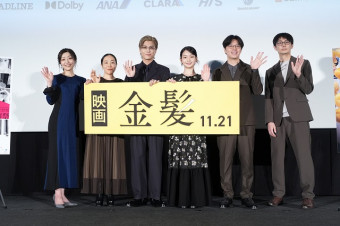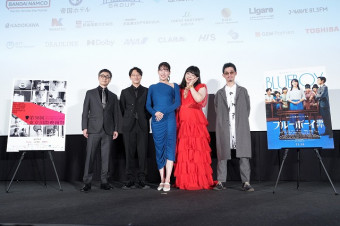Touts World Premieres from Acclaimed Auteurs Rithy Panh, Zhang Lu, Chong Keat Aun in Competition

From left: Sakashita, Takiuchi, Nakagawa
The Tokyo International Film Festival (TIFF) today unveiled the full lineup and other highlights of its 38th edition in a press conference held at Tokyo Midtown Hibiya, one of the festival’s main venues.
As previously announced, TIFF will open with Sakamoto Junji’s Climbing for Life, based on the true-life story of legendary mountaineer Tabei Junko, and close with Academy Award® winning director Chloé Zhao’s heralded Hamnet, about the creation of William Shakespeare’s timeless masterpiece Hamlet.
The 10-day festival will feature screenings and extensive related events in the Hibiya-Yurakucho-Marunouchi-Ginza area of Tokyo from October 27 to November 5, 2025.
Festival Chairman Ando Hiroyasu delivered opening remarks at the conference, highlighting three major focuses of this year’s TIFF: enhancing the festival’s international exchange initiatives, addressing gender disparity through programs to support female empowerment, and nurturing talent that will shape the industry’s future.
TIFFCOM Managing Director Ikeda Kaori then discussed TIFFCOM 2025, TIFF’s affiliated marketplace, which will be hosting its 22nd edition from October 29 to 31 at the Hamamatsucho-kan Building, a short ride from TIFF’s main venues. Ikeda highlighted the market’s role in facilitating extensive business meetings, seminars and production matching for a wide range of content—films, TV programming, animation, streaming series—as well as the sixth year of the Tokyo Gap Financing Market, which will host 23 film and animation projects from around the world.
Italian film critic Carlo Chatrian, former Artistic Director at the Berlin and Locarno film festivals and previously announced President of the International Competition Jury at the 38th TIFF, will be joined by fellow jurors Taiwanese actor Gwei Lun-Mei, French film editor Matthieu Laclau, Japanese actor/filmmaker Saitoh Takumi, and Chinese filmmaker/producer Vivian Qu. The Asian Future Jury is comprised of Ellen Y.D. Kim, director of the Asian Contents and Film Market at the Busan International Film Festival, filmmaker Matsunaga Daishi, and Nishizawa Akihiro, programming manager of Tokyo Theatres Co., Inc.
The 38th TIFF Festival Navigator Takiuchi Kumi then appeared on stage and shared her thoughts on serving in the role, noting that she hoped to foster a dialogue with as many festival attendees as possible, and encouraging people to see as many films as possible during TIFF.
Following video clips from TIFF’s Opening Film Climbing for Life (by Sakamoto Junji), Centerpiece Film Tokyo Taxi (by Yamada Yoji), and Closing Film Hamnet (by Chloé Zhao), all of which were previously announced, TIFF Programming Director Ichiyama Shozo unveiled the 15 films chosen for the festival’s Competition section, which includes premieres from heralded auteurs Rithy Panh, Zhang Lu, Pen-Ek Ratanaruang, and Chong Keat Aun.
Two Japanese directors whose work will receive world premieres in Competition then joined Ichiyama on stage to make remarks about their selection: Sakashita Yuichiro (Blonde) and Nakagawa Ryutaro (Echoes of Motherhood).
Senior Programmer Ishizaka Kenji introduced the Asian Future section lineup and provided highlights of the 10 films in competition from Japan, Southeast Asia and Iran, all of which are receiving their world premieres and will be eligible for awards. He also touted the section’s opening film, an “iconic work, Journey into Sato Tadao, about the great cinema critic who died three years ago. It’s a documentary about his years searching for Asian films, and in launching the Asian section of this festival.”
Ichiyama then introduced the films in the Gala Selection, World Focus, Nippon Cinema Now, and newly established section Asian Students’ Film Conference, as well as in other special sections of the festival.
TIFF Senior Programmer Andrijana Cvetkovikj provided an overview of the second edition of the Women’s Empowerment section, which will highlight seven films. She stressed, “Our hope is that the section does more than inspire. We want it to open doors, to build partnerships, and to create spaces where women can support and mentor one another. Above all, we want women’s voices to be heard, respected, and celebrated as an essential part of global cinema.”
TIFF Animation Programming Advisor Fujitsu Ryota unveiled the full Animation section, which will feature screenings of 12 new Japanese and international works, including the Annecy International Animation Film Festival’s Jury Award winner, ChaO, as well as an 80th anniversary screening of Momotaro, Sacred Sailors (4K remaster), Japan’s first feature-length animated film, a propaganda work directed by Seo Mitsuyo that was produced during WWII with backing from the Ministry of the Navy.
The three films nominated for the TIFF Ethical Film Award were introduced, along with the award’s jury president, Ikeda Elaiza. As previously announced, the recipients of the Kurosawa Akira Award are directors Lee Sang-il and Chloé Zhao, both of whom will be present at the festival. TIFF and The Japan Foundation will be co-presenting the popular TIFF Lounge for the 6th time this year, and there will be a talk session between directors Yamada Yoji and Lee Sang-il, whose box-office hit Kokuho is Japan’s official Oscar submission. Among the many other event highlights will be a forum by Cinema Connecting Japan, a Kering’s Women In Motion event.
The 38th TIFF will be held from October 27 to November 5, 2025 in the Hibiya-Yurakucho-Marunouchi-Ginza area and other venues in Tokyo.
Comments from Press Conference Guests
Takiuchi Kumi, Festival Navigator, 38th TIFF
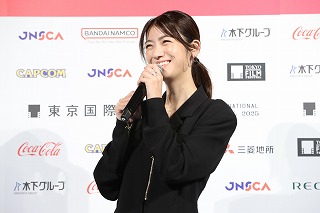
I’ve attended TIFF many times since making my debut as an actress. As a member of FIAPF, it’s one of the top film festivals in Asia, with a deep history and a pioneering role. When I first was appointed as navigator, I wondered ‘What does a navigator do?’ but I’ll do my best to foster a dialogue with all of you. Some of the films that are difficult to distribute in Japanese cinemas can be shown at festivals, so you can come to see such films and enjoy them in TIFF theaters. It’s all about looking for hidden gems.
Sakashita Yuichiro, Director of Competition film Blonde
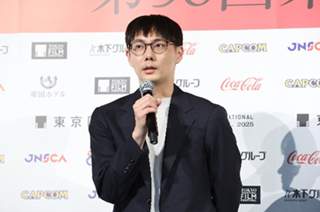
I first submitted a film to TIFF about 10 years ago with my first film, but didn’t get selected, and I’ve been attending as an audience member ever since. I’m so happy that one of my films is now being screened in TIFF. For Blonde, I started planning the project about four years ago based on some strict school rules that were making the news. So I began working with producers that I’d worked with before to develop the script. I hope audiences take this opportunity to come and watch many films at TIFF.
Nakagawa Ryutaro, Director of Competition film Echoes of Motherhood
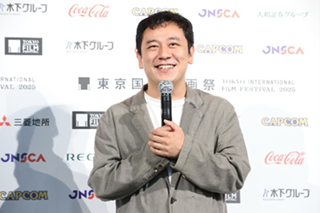
Twelve years ago, I came to TIFF for the first time, which launched my career. I’m very happy to be back. I’ve had two short films screened in TIFF and two years ago I was invited for the Gala Selection. This is the first time I’ve been in the Competition section, and I’m very honored to be selected this time.
For Echoes of Motherhood, I had a very supportive producer. I’m really honored that I’ve been selected. I look forward to going and seeing lots of films at TIFF this year.
Comments from the TIFF Chairman, Programming Director
Ando Hiroyasu, Chairman, 38th TIFF
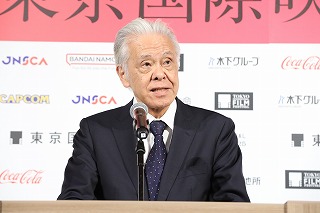
Looking out across the world, we are concerned to see divisions and conflicts arising in many places, with confrontations deepening. In this kind of environment, we hope to use the medium of film to help build a more harmonious world, by viewing and discussing, and thus deepening our mutual understanding of different perspectives. This year’s TIFF poster depicts two women conversing in a café about war, politics, and everyday topics. We believe this encapsulates the themes of understanding and harmony that we strive for.
We have three key focuses this year. The first is enhancing the TIFF Lounge, which brings together key film people from Japan and abroad to engage in discussions. We want to escalate it to another level. The second focus is on significantly enhancing the exchange lounge that we established in Tokyo Midtown Hibiya last year, a key international exchange venue. We are planning numerous talks and parties featuring renowned filmmakers from Japan and abroad. Additionally, we are reviving our Closing Party after a five-year hiatus.
As part of our commitment to gender issues, the Women’s Empowerment section launched last year will feature screenings and discussions with international guests. We are also focusing on cultivating future talent. We want to focus on nurturing the future generation in the industry. The newly established section Asian Students’ Film Conference will feature a competition of works under 60 minutes recommended by Asian film schools, and students will be invited to join the festival in Japan.
Ichiyama Shozo, Programming Director, 38th TIFF
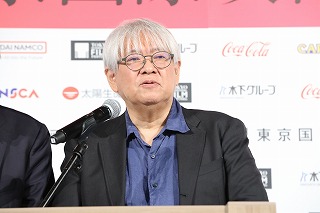
Every year we do our best to offer diverse works from around the world in the Competition section, focusing on the quality of the films rather than the countries from which they originate. This year we have two films from China and three more from Southeast Asia. We also have films from Europe, Japan, the US, Azerbaijan and Palestine. We have films focusing on many urgent social and political issues, as well as several documentaries. There are many different genres, stories and themes. I think all the films are unique and exciting, and I look forward to hearing your reactions.
For the Gala Selection, we have a variety of films in the public eye, including Ari Aster’s Eddington and Óliver Laxe’s Sirat and Peter Ho-Sun Chan’s She Has No Name, starring Zhang Ziyi. Most of the films will be screened later in Japanese cinemas, but this is your first chance to see them on a big screen.
In the World Focus section, there are 8 buzzy films drawn from film festivals around the globe. There are too many great films from which to choose, but this is a selection that particularly impressed us.
In the Nippon Cinema Now section, we have 9 titles, some of which were screened previously at other festivals. We decided not to include a Director in Focus sidebar this year, but we have included such highlights as Lost Land, from Fujimoto Akio, which recently won awards at the Venice Film Festival.
This year we have a new section, the Asian Students’ Film Conference, for which we’ve asked film schools across Asia to recommend under-60-minute works, and have now selected 15 films by students that will be given awards by a jury. We have films from Japan, Korea, Taiwan, Vietnam and others, including three animated films. We will also conduct a master class with the students present.
During a Q&A session at the end of the press conference, the two Japanese directors in the Competition section appeared first with Festival Navigator Takiuchi Kumi.
Takiuchi was asked why she had mentioned that she was interested in watching the film Palestine 36, Hen, Echoes of Motherhood and Far in the Middle of the East. She responded, “I want to watch it because we want to learn about the origin of the problem. It’s always in the news. Actors in Japan are criticized for talking about politics, but such films as this are often difficult to screen in theaters, so we have the unique opportunity to watch them at film festivals. I’m looking forward to it.”
The two directors were then asked about their films. Nakagawa Ryutaro spoke about casting acclaimed auteur Kawase Naomi in his work. “We have a different image of her,” he admitted. “She’s a challenging person, but she gave power to the film. She’s able to show her emotions and expressions, she really shows the complexity of human beings. As a director, she supported me to make this film.”
Sakashita Yuichiro discussed the development of his film, noting that it isn’t easy to get support for original scripts. “The film is not from the students’ perspective, as one would expect, but from the teacher’s perspective,” he explained. “The main role is the teacher, not the students who are protesting that they want to be allowed to have blonde hair. I wanted it to be a comedy, but stepping aside from the school’s strict rule, I hope you’ll smile and laugh, even as you learn about other more serious issues.”
Ando Hiroyasu and Ichiyama Shozo then appeared for questions.
Asked why there were no Indonesian films in the festival, Ichiyama noted that, “There were some that made the short list for the Competition, but I can’t go into details about why a film is selected or not. It has nothing to do with being from a certain country, of course. I’m disappointed that we don’t have an Indonesia film, but I hope this can improve. Of the Indonesian films I’m aware of, none were actually submitted to the festival.”
Asked how many films were submitted from China, Ichiyama said, “There were many, so I’m afraid I don’t have a total count. I believe there are some Chinese films across our various sections, but the number of submissions was very high this year.”
A journalist asked about actor/filmmaker Saitoh Takumi’s inclusion on the Competition jury, and Ichiyama said, “He has been coming to the festival for years. He was a jury member for the Ethical Award jury last year and had a great dialogue with the other jury members and attendees. I’ve been after him for a year or so and I’m glad he could clear his busy schedule to take part.”
Another journalist mentioned that regardless of the international situation, films were shown from Israel and Russia in the past. Were there any such films submitted this year, he queried. And why were so many films from Southeast Asia included?
“TIFF is very film-centric, we do not exclude films from any country,” responded Ichiyama. “As for Southeast Asia, there’s a lot of momentum economically, and there are a lot of films being created for film festivals, not just commercial entertainment films.”
Competition Section Lineup for the 38th TIFF
•Number of submissions for the 38th TIFF: 1,970 films (last year: 2,023)
•Number of countries and regions: 108 (last year: 110)
•Films by female directors: 43 (approx. 23.5%)
*Directors are counted only once, regardless of the number of titles they are showing at TIFF.
*The number of films by female directors last year was 51, including 6 co-directed works with both male and female directors (approx. 24.4%).













